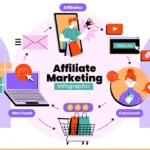As a project manager or operations lead overseeing digital growth, you know that hiring the wrong marketer can cost you months of wasted budget, lost momentum, and internal friction. But with the right sourcing approach, you can hire an ecommerce specialist who’s already vetted, proven, and ready to hit the ground running.
Below are 7 proven places to find pre-vetted eCommerce marketing experts. Each entry includes what they specialize in, the vetting process, and pros + cautions so you can pick the best fit for your project.
1. Specialist Freelance Marketplaces (Vetted Talent Pools)
These are marketplaces built around heavy vetting or selective admission. You won’t get 1,000 random bids but you’ll get fewer, credible candidates.
- Toptal (Marketing division): claims to offer the “top 3% of marketing experts.”
Pros: High caliber candidates, built-in quality control, trial period options.
Caution: Higher rates; often better for mid-to-senior engagements rather than small experiments.
- GrowTal: matches you with pre-vetted marketing professionals (SEO, paid acquisition, content) in 48 hours.
Pros: Fast turnaround; flexible hourly or part-time options.
Caution: Because they vet for general marketing skills, be precise in your eCommerce requirements (e.g. Shopify, ROAS metrics).
- MarketerHire / Alternatives: platforms that pre-screen marketers and match them to projects in 3–5 days.
Pros: Dedicated account support; good matches for growth roles.
Caution: May not always have deep eCommerce/technical marketing specialists; check portfolios.
When to use: Ideal when you want speed + quality, and can accept premium rates in exchange for risk mitigation.
2. Boutique Agencies via Pre-Vetted Agency Marketplaces
Sometimes, you want a small team (rather than a single freelancer) or more hands-on service. Here are curated agency networks:
- FreeUp Agency Program: introduces vetted boutique agencies across eCommerce, ads, Amazon, web dev, etc.
Pros: You get an established team, not just an individual; agency overhead often already baked into pricing.
Caution: Slightly less flexible than freelancers; rates might include margin.
- HireTheStarters: a roster of pre-vetted freelancers and small agencies ready for full-time or project-based work.
Pros: Commission-free hiring; you see bios, past work, rates upfront.
Caution: As with any agency, check alignment in niche (e.g. DTC, marketplace, B2B).
When to use: Best when you want a lean but capable team with accountability, rather than piecing together freelancers yourself.
3. eCommerce Recruitment / Staffing Agencies
If your role is more permanent or you want someone embedded, go to specialized recruiters.
- Constant Hire: connects you with pre-vetted eCommerce marketing talent in ~5 days
Pros: Deep domain focus, handle screening + shortlisting, replacement guarantees.
Caution: Recruitment fees; less flexibility for very short-term or fractional assignments.
- Ecommerce / Digital Recruiting Firms: e.g. AC Lion and others (listed by industry blogs) focused on growth, marketplace, Amazon, etc.
Pros: Access to senior-level talent, passive candidates you can’t reach via marketplaces.
Caution: Often requires higher budgets, sometimes minimum retainer or exclusivity.
When to use: Use recruiters when you’re hiring long-term or want candidates you can’t find via open marketplaces (e.g. passive, senior). Always negotiate vetting and guarantee terms.
4. Niche Job Boards + Curated Talent Platforms
These are boards or platforms that emphasize quality over quantity, often with screening before posting.
- eCommerce-specific job boards (e.g. those run by eCommerce conferences, tool providers, or niche marketing forums).
Pros: Candidates are already interested in your domain; fewer irrelevant resumes.
Caution: Still require your own vetting; not always pre-vetted.
- Freelance job boards with curated / premium tiers (e.g. Upwork Pro / Talent, Behance invites, Dribbble’s vetted talent).
Pros: You get some filtering (e.g. platform pre-screening).
Caution: You still must check for true eCommerce metrics knowledge (ROAS, LTV, checkout funnel).
Platforms like HireWithNear recommend combining global freelance marketplaces + relationship building via LinkedIn for identifying strong marketers.
When to use: For mid-level roles or when you’re okay doing part of the vetting work yourself, but want a more relevant pool of candidates.
5. Referral Networks / “Closed” eCommerce Communities
Often, the best candidates come from word-of-mouth in niche circles.
- eCommerce Slack / Discord / mastermind groups: many experts lurk but don’t actively bid on open marketplaces.
- Alumni / peer networks: ask trusted operators, other eCommerce brands, or fellow PMs for referrals.
- Industry events / conferences: connect in person (or virtually) and recruit from speakers or active participants.
Pros: You can get high-trust recommendations, hidden gems.
Caution: You’ll still need to vet (case studies, references, sample work). But at least you begin with a warmer lead.
6. Hybrid Models (Recruiter + Tech Platform)
Some newer services mix tech matching with human vetting + recruiter support.
- These platforms let you post your role, then their algorithm or team surfaces handful of best fits, but then a human recruiter steps in to validate and handle the handoff.
- Many also offer “risk-free trial windows,” replacement guarantees, or only charge if you hire.
This model gives you both reach and quality control and it gets helpful when you want to scale hiring without losing hands-on oversight.
7. In-House Pipeline + Talent Bench (Build Your Own Vetting Funnel)
If you expect to hire several eCommerce specialists over time, owning the pipeline is smart.
- Maintain a roster of “backup” candidates (freelancers or junior marketers) and run small test engagements (e.g. paid trial, small campaign) to vet them.
- Use case-study submissions, mini audits, or paid tests as part of vetting before full-time offers.
- Build relationships over time; you’ll often beat the market because quality candidates prefer known pipelines.
Pros: Lowest cost per hire over time; control over standards.
Caution: Requires investment in the vetting process, and may not deliver on tight deadlines initially.
How to Vet Before You Hire (No Matter the Source)
Irrespective of the channel, here’s a checklist to ensure you actually hire an ecommerce specialist, not just a “marketer”:
- Ask for real ecommerce results (ROAS lifts, AOV increases, repeat rate improvements) and not vague “increased traffic.”
- Inspect their account-level work (ad dashboards, dashboards, internal spreadsheets) and request redacted screenshots and explanations.
- Run a paid mini-test (e.g. 2–4 week campaign) before committing long-term.
- Validate process, not just outcome and ask them to walk you through how they’d approach your store, CTRs, budget pacing.
- Reference check with past clients, preferably ones in your niche or industry.
- Ensure domain knowledge: Shopify / Magento / BigCommerce, email retention, CRO, analytics stack, etc.
- Set a probation / guarantee window (30- to 60-days) so that if it doesn’t produce, you can replace or terminate.
Summary & Recommendation
If your goal is to hire an ecommerce specialist swiftly and reliably, start with high-trust marketplaces (Toptal, GrowTal) or agency networks (FreeUp). If you’re recruiting for a permanent role, pair that with a specialized recruiter (like Constant Hire for ecommerce marketing recruitment) or build your own vetted pipeline.
In your project context, begin by defining:
- Key deliverables and metrics you expect (ROAS, LTV, cohort retention)
- Time horizon (short-term test vs long-term hire)
- Budget bands (top talent costs more)
- Domain & technical stack (Shopify, Amazon, etc.)
Then pick one or two sourcing channels above, run your mini-test, and you’ll drastically reduce risk in your next hire.










